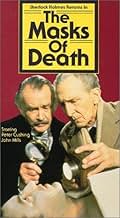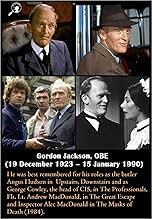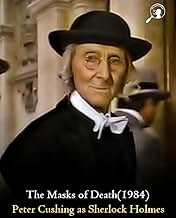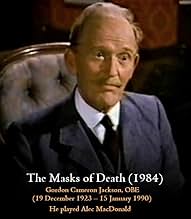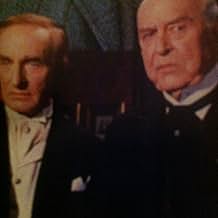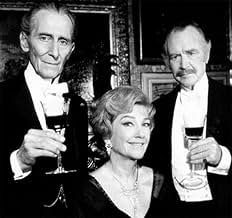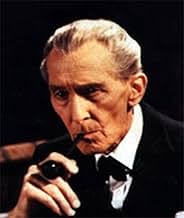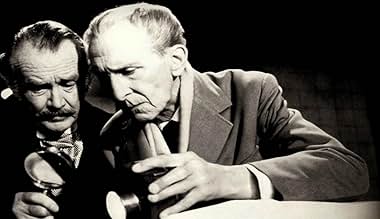अपनी भाषा में प्लॉट जोड़ेंSherlock Holmes investigates the case of a string of mysterious deaths with no apparent causes and the case of a missing German Prince that could cause war between England and Germany.Sherlock Holmes investigates the case of a string of mysterious deaths with no apparent causes and the case of a missing German Prince that could cause war between England and Germany.Sherlock Holmes investigates the case of a string of mysterious deaths with no apparent causes and the case of a missing German Prince that could cause war between England and Germany.
- निर्देशक
- लेखक
- स्टार
फ़ीचर्ड समीक्षाएं
The story is a little on the thin side, if decidedly chilling at the climax. But the pleasure of watching a first-rate assortment of mature actors go through their paces makes this a show worth watching again and again. Peter Cushing's Holmes is severe, ascetic and all business, John Mills' Watson cheerful and worth having in a tight spot, and Anne Baxter's Irene Adler a genuinely charming and intelligent lady.
The Masks of Death is a real coming together of classics. First of all, we have the fact that the film is based on the classic Arthur Conan Doyle character of Sherlock Holmes (albeit it an aging version of the character), then we have the fact that the film is directed by the great Roy Ward Baker; a name that fans of classic British horror will recognise instantly, and perhaps most important of all is the presence of one of the finest British actors ever to grace the silver screen - the great Peter Cushing in a reprisal of the iconic role that he last played in 1968. The story is not a Conan Doyle original, but still focuses on his most famous character. Sherlock Holmes has been called in to investigate three bodies that have mysteriously turned up in the Thames. It's not into the investigation before he is called to investigate another case; that being the investigation of a German prince that mysteriously disappeared. However, shortly into his second case; Holmes begins to suspect that something more sinister may be afoot.
What sets this film apart from almost every other Sherlock Holmes film ever made is the fact that this one shows the character in his twilight years. Holmes is in retirement and he's not quite his usual sharp self and even shows some failings on a number of occasions. One of the main things that is liked about the character is his sharpness and keen eye for detail; but even so, The Masks of death has to be admired for daring to do something a little different. And who better to portray this aging Holmes than the great Peter Cushing? Cushing would have been seventy years old at the time of filming and still manages to inject his usual verve and screen presence into what would turn out to be his penultimate screen role. Roy Ward Baker certainly knows how to direct and does a good job here as the film moves swiftly and the shots of a dingy London are very well done. Cushing receives good support from the likes of John Mills, Anton Diffring and Ray Milland too, which is nice. It does have to be said that this isn't the most interesting Holmes story ever put on the screen; but its well worked and entertaining and the ending is intriguing and imaginative.
What sets this film apart from almost every other Sherlock Holmes film ever made is the fact that this one shows the character in his twilight years. Holmes is in retirement and he's not quite his usual sharp self and even shows some failings on a number of occasions. One of the main things that is liked about the character is his sharpness and keen eye for detail; but even so, The Masks of death has to be admired for daring to do something a little different. And who better to portray this aging Holmes than the great Peter Cushing? Cushing would have been seventy years old at the time of filming and still manages to inject his usual verve and screen presence into what would turn out to be his penultimate screen role. Roy Ward Baker certainly knows how to direct and does a good job here as the film moves swiftly and the shots of a dingy London are very well done. Cushing receives good support from the likes of John Mills, Anton Diffring and Ray Milland too, which is nice. It does have to be said that this isn't the most interesting Holmes story ever put on the screen; but its well worked and entertaining and the ending is intriguing and imaginative.
In the mid 1970s Kevin Francis (son of legendary cinematographer and director Freddie Francis) made a foolhardy attempt to keep alive the old school of British horror that he had grown up with (and to which his father had made significant contributions). Unfortunately he was tilting at windmills as his company Tyburn, which had previously released Richard Burton's DOCTOR FAUSTUS in 1967, did not have the financial resources, nor the distribution capabilities, and ultimately the audience to make his grand scheme work. In 1975 they made three films (LEGEND OF THE WEREWOLF, THE GHOUL, PERSECUTION) before retreating into television where they kept a very low profile. In 1984 they once more rose to the occasion by giving Peter Cushing one last meaty role to close out his career on. It was a role that he had played 25 years earlier in Hammer's HOUND OF THE BASKERVILLES. That role, of course, was Sherlock Holmes.
Cushing was 70 years old when shooting on the film began and once more the game was afoot. Tyburn surrounded him with several old friends and top flight talent so that THE MASKS OF DEATH would be a grand sendoff. His old Hammer compatriots actor Anton Diffring and director Roy Ward Baker were there and Tyburn recruited Ray Milland and Anne Baxter from America to enrich the proceedings. The biggest coup however was getting John Mills to play Dr. Watson. Picking up where Andre Morell had left off in HOUND (Morell died in 1978), Mills is the perfect Watson...intelligent, trustworthy, and devoted to his friend. There is a great chemistry there which enhances their scenes together and it helps to make MASKS one of the better Holmes offerings especially for a film that is a TV movie complete with blackouts. What it lacks due to budgetary restrictions is more than made up for by watching these old pros in action.
The film opens in 1926 with an aged Watson hiring a stenographer to set down in writing the details of a case that had been supressed by the British government for more than a decade. Cushing, his frame as thin as ever and with white hair, epitomizes Holmes with just a roll of the eyes as he urges Watson to get on with it. The bulk of the story takes place in 1913 right before the outbreak of World War I. While investigating the discovery of three bodies, their faces distorted horribly (hence the title), Holmes is approached by the Home Secretary (Milland) and a German aristocrat (Diffring) to drop that case and find a missing member of German royalty. This leads Holmes & Watson in many directions for there is more going on than meets the eye. To say anything else would be criminal...For more reviews visit The Capsule Critic.
Cushing was 70 years old when shooting on the film began and once more the game was afoot. Tyburn surrounded him with several old friends and top flight talent so that THE MASKS OF DEATH would be a grand sendoff. His old Hammer compatriots actor Anton Diffring and director Roy Ward Baker were there and Tyburn recruited Ray Milland and Anne Baxter from America to enrich the proceedings. The biggest coup however was getting John Mills to play Dr. Watson. Picking up where Andre Morell had left off in HOUND (Morell died in 1978), Mills is the perfect Watson...intelligent, trustworthy, and devoted to his friend. There is a great chemistry there which enhances their scenes together and it helps to make MASKS one of the better Holmes offerings especially for a film that is a TV movie complete with blackouts. What it lacks due to budgetary restrictions is more than made up for by watching these old pros in action.
The film opens in 1926 with an aged Watson hiring a stenographer to set down in writing the details of a case that had been supressed by the British government for more than a decade. Cushing, his frame as thin as ever and with white hair, epitomizes Holmes with just a roll of the eyes as he urges Watson to get on with it. The bulk of the story takes place in 1913 right before the outbreak of World War I. While investigating the discovery of three bodies, their faces distorted horribly (hence the title), Holmes is approached by the Home Secretary (Milland) and a German aristocrat (Diffring) to drop that case and find a missing member of German royalty. This leads Holmes & Watson in many directions for there is more going on than meets the eye. To say anything else would be criminal...For more reviews visit The Capsule Critic.
Above all else, this TV movie was most welcome for giving Peter Cushing a chance to end his acting career on a high note and in one of his most celebrated roles (he appeared in one more film after this one but this was to be the last lead role of his long career). He'd first played Sherlock Holmes twenty-five years previously in a Hammer movie, and then in a 1968 BBC television series. Here, he revisits the character in a later stage of life and, accordingly, this time his rendition of the great detective is less agile and prone to moments of impatience and tetchiness. Cushing is just one of a number of senior actors in the cast, many of them sadly fast-approaching the end of their careers... Anne Baxter, Gordon Jackson, Anton Diffring... Ray Milland also sadly was not in great health at the time and it shows. Nevertheless, all give very good performances as one would expect from such distinguished names. The piece is nicely filmed with good location work and the music is okay too but unfortunately everything is let down by the plot. Much of the narrative involves Holmes and Watson investigating a supposed kidnapping which ultimately proves to be nothing more than a red-herring, conceived to keep Holmes distracted from another more important matter. One can't help wondering if it would have been easier for the villains to have simply assassinated Holmes if they were so worried about him bringing them to justice. And once this duplicity is discovered, the characters involved just vanish from the action and the story suddenly shifts to a climax that is, in itself rather unsatisfying. Why do Holmes and Watson, two ageing men, risk their lives in flushing the villains out of their lair when the police apparently have the whole place surrounded anyway?
It was a nice idea to see a more elderly Holmes in action for once and even better to have Peter Cushing playing him once again, and it's a shame that plans for a proposed follow-up never came to fruition, because a better story might have worked wonders. A good attempt that just doesnt quite come off.
It was a nice idea to see a more elderly Holmes in action for once and even better to have Peter Cushing playing him once again, and it's a shame that plans for a proposed follow-up never came to fruition, because a better story might have worked wonders. A good attempt that just doesnt quite come off.
If you're a fan of traditionally British suspense and cult cinema, it's pretty much impossible to dislike this modest, made-for-TV Sherlock Holmes oddity. In the mid-80s, long after the heyday of British studio-horror, veteran Roy Ward Baker directs his former Hammer regular Peter Cushing as he depicts Sir Arthur Conan Doyle's creation Sherlock Holmes for one last time. Cushing played Holmes in the fifties ("The Hound of the Baskervillers") and in a TV-series of the sixties, so for this occasion, the super-detective is allegedly retired, but still in close contact with his good buddy Dr. Watson and Scotland Yard inspector MacDonald. The latter begs Holmes to help with a curious case of three dead bodies that were discovered in the Thames. The corpses show no signs of physical violence, but the expression on their faces indicate that they died of pure fear. Before Holmes can properly start to investigate, his services are confiscated by the British Home Secretary and a dubious German ambassador named Von Felseck. They urge Sherlock Holmes to find a young German prince who went missing from Von Felseck's residence, as his disappearance might lead directly to a war between Germany and England. "The Masks of Death" certainly isn't the greatest Sherlock Holmes story ever penned down (it's not even based on an A.C. Doyle original, in fact) but it's tense and compelling enough to keep you guessing
along with Holmes and Watson. It's quite far-fetched and implausible, but there are a several inventive plot twists and scenes with plenty of action. Holmes' retirement age also turns out to be an ingenious gimmick, as he's occasionally less observant, sharp or subtle. Especially his thoughts on strong, opinionated women are chauvinist and old-fashioned.
क्या आपको पता है
- ट्रिवियाThis was Peter Cushing's final television appearance before his death on August 11, 1994 at the age of 81.
- भाव
Dr. John H. Watson: No sane man wants war.
Sherlock Holmes: That is the trouble, Watson. There are otherwise sane men who do want war.
- कनेक्शनReferenced in The Nostalgia Critic: The Great Mouse Detective (2023)
टॉप पसंद
रेटिंग देने के लिए साइन-इन करें और वैयक्तिकृत सुझावों के लिए वॉचलिस्ट करें
विवरण
- रिलीज़ की तारीख़
- कंट्री ऑफ़ ओरिजिन
- भाषा
- इस रूप में भी जाना जाता है
- Sherlock Holmes and the Masks of Death
- फ़िल्माने की जगहें
- उत्पादन कंपनी
- IMDbPro पर और कंपनी क्रेडिट देखें
- चलने की अवधि
- 1 घं 18 मि(78 min)
- ध्वनि मिश्रण
इस पेज में योगदान दें
किसी बदलाव का सुझाव दें या अनुपलब्ध कॉन्टेंट जोड़ें

